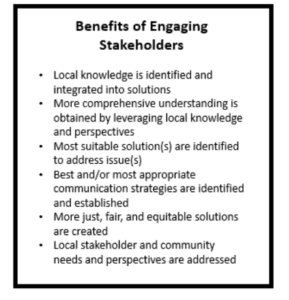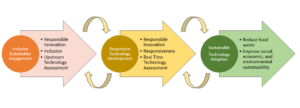How Can We Engage Stakeholders to Address Risks?
Similar to other states, North Carolina is currently dealing with a number of environmental and societal challenges. Whether it is dealing with the damage and costs of hurricanes, the presence of industrial chemicals in our water supplies, or dealing with legacy issues such as nutrient run-off and coal-ash, it is essential that we come together as communities to address these complex challenges.
Extension agents, government officials, researches, and others interested in responding to critical issues will often benefit from engaging various stakeholders and community members in developing solutions to our environmental and societal challenges. By engaging stakeholders, a more comprehensive view of issues can be characterized, more suitable solutions can be identified and potentially implemented, and communication strategies and campaigns can be tailored towards the impacted populations to best meet needs and preferences. Engaging stakeholders can also help ensure that implemented solutions are just, fair, equitable, and respond to diverse needs and perspectives.

For these reasons, this NC State Extension publication outlines the key steps to engage stakeholders and community members to identify and address potential environmental and societal issues.
As detailed in this publication, the key steps to stakeholder engagement are:
- Define goals for engaging stakeholders
- Identify and select stakeholders
- Select engagement activity
- Conduct engagement
- Compile results, reflect, and revise.
Click here for a full PDF file.
Engaging stakeholders and community members can also help support principles of responsible innovation and advance sustainability. For example, our NC State-funded GRIP4PSI project Sweet-APPS, intentionally integrates stakeholder perceptions and needs within early innovation and design phases to help improve social, economic, and environmental sustainability of new technology designed to improve the NC sweetpotato industry. See more details in this publication.

